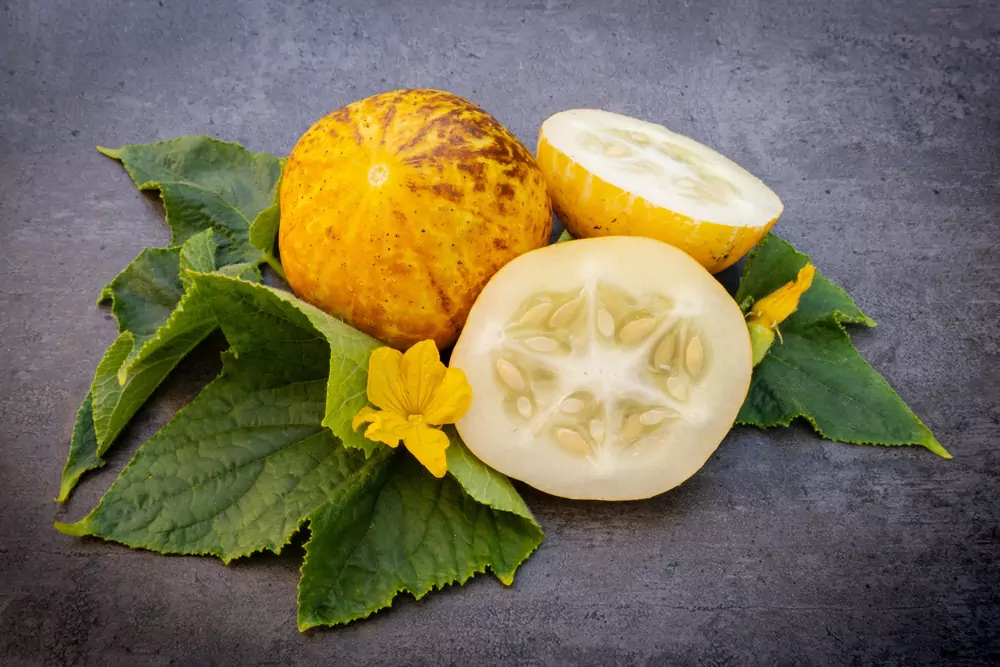In the world of unique and delightful produce, lemon cucumbers stand out as a refreshing surprise. With a name that evokes both zest and crispness, these vibrant fruits bring a burst of flavor to the table.
As we dive into the world of lemon cucumbers, their distinct appearance, coupled with a subtle citrus undertone, promises a culinary journey that is as visually appealing as it is delicious. Join us as we unravel the charm of lemon cucumbers and discover the versatility they bring to your kitchen.
Lemon Cucumber Appearance
The lemon cucumber is a small, round, and yellow cucumber that resembles a lemon in size and color. It has smooth, thin skin with a slightly bumpy texture and is often compared to a small melon in appearance.
The lemon cucumber typically measures around 2-3 inches in diameter and has a bright, pale yellow color. Its appearance makes it easily distinguishable from other cucumber varieties, making it a popular choice for culinary and decorative purposes.
Size And Shape
Lemon cucumbers are small, round, and yellow, resembling a lemon in size and shape. They typically measure around 2-3 inches in diameter and are slightly oblong or oval. The skin is thin and smooth, with a bright yellow color, and the flesh inside is tender, juicy, and mild in flavor. These cucumbers are often used in salads or pickling or eaten fresh as a healthy snack.
Texture Of Skin
The skin of a lemon cucumber is smooth, thin, and tender, similar to the texture of a regular cucumber. It has a slightly bumpy surface with a pale yellow or light green color, and the skin is edible and does not require peeling. When ripe, the skin may have a slightly waxy feel, but it is delicate and pleasant to eat.
Coloration
The lemon cucumber, also known as the yellow cucumber, is a small, round, and yellow-colored cucumber variety. The coloration of the lemon cucumber is pale yellow to bright yellow, resembling the color of a lemon, hence its name. The skin of the lemon cucumber is thin and tender, and its flesh is crisp and juicy.
When ripe, the lemon cucumber’s coloration is vibrant and can add a pop of brightness to salads and dishes. The yellow color of the lemon cucumber is visually appealing and indicates its ripeness and readiness for consumption.
Taste Profile
The lemon cucumber is a refreshing and flavorful vegetable with a unique taste profile. It has a mildly sweet and slightly sour taste, similar to a cucumber, but with a hint of lemon. The flavor is crisp and refreshing, making it perfect for salads, sandwiches, and other dishes where a light and refreshing taste is desired.
The texture is crunchy and juicy, with a slightly tender skin that adds to its appeal. Overall, the lemon cucumber is a delicious and versatile vegetable that will please even the most discerning pala.
Culinary Uses

Lemon cucumbers are a unique and versatile ingredient that can add flavor and freshness to various dishes. Here are some of the culinary uses of lemon cucumbers:
Salads
Lemon cucumbers are perfect for making refreshing salads. Their mild flavor and crunchy texture make them a great addition to green salads, pasta salads, and grain salads. You can also use them as a base for a lemon cucumber salad, topped with other vegetables like cherry tomatoes, red onions, and feta cheese.
Sandwiches and Wraps
Lemon cucumbers are a great addition to sandwiches and wraps, adding a cool and refreshing flavor. They pair well with creamy cheeses like brie or goat cheese and can also substitute traditional cucumbers in tzatziki sauce.
Soups and Stews
Lemon cucumbers can also be used in soups and stews, adding flavor and freshness. They pair well with creamy soups like cream of cucumber or cream of asparagus and can also be used in hearty stews like beef or lamb stew.
Juicing and Smoothies
Lemon cucumbers can be juiced or blended into smoothies, adding a refreshing and healthy twist to your drink. They pair well with other fruits like strawberries, blueberries, and bananas and can also be used as a detoxifying juice or smoothie base.
Pickling and Preserving
Lemon cucumbers can be pickled or preserved in vinegar, adding a tangy and crunchy element to your dishes. They can be used as a side dish or added to salads, sandwiches, and wraps.
Nutritional Content
Here is a table of the nutritional content of lemon cucumbers per 100 grams:
| Nutrient | Amount |
| Calories | 15 |
| Total Fat | 0.2g |
| Saturated Fat | 0g |
| Cholesterol | 0mg |
| Sodium | 2mg |
| Total Carbohydrate | 3.6g |
| Dietary Fiber | 1.5g |
| Sugars | 1.8g |
| Protein | 0.6g |
| Vitamin C | 14.7mg |
Growing Conditions

To successfully grow lemon cucumbers, it is essential to understand the optimal growing conditions for this particular variety.
Soil Conditions
Lemon cucumbers thrive in well-drained soil with a pH level between 6.0 and 7.0. The soil should contain organic matter and nutrients to support healthy growth. Additionally, ensuring the soil is warm enough for planting is essential, as lemon cucumbers prefer temperatures between 60°F and 95°F.
Sunlight and Temperature
Lemon cucumbers require full sunlight for at least 6-8 hours daily to thrive. They also prefer warm temperatures and are sensitive to frost. Therefore, it is best to plant them after the last frost date in your region. The ideal temperature range for lemon cucumber growth is between 70°F and 85°F.
Watering and Humidity
Consistent watering is crucial for lemon cucumber plants, especially during the flowering and fruiting stages. It is essential to keep the soil consistently moist but not waterlogged. Additionally, lemon cucumbers benefit from moderate humidity levels, so providing adequate moisture in the air can promote healthy growth.
Support and Spacing
Lemon cucumber plants are vining plants that benefit from vertical support such as trellises or cages. Proper spacing is also essential to allow for adequate airflow and sunlight penetration. When planting lemon cucumbers, ensure they have enough space to spread out without overcrowding.
Pest and Disease Management
Like other cucumber varieties, lemon cucumbers are susceptible to certain pests and diseases, such as aphids, cucumber beetles, powdery mildew, and bacterial wilt. Implementing preventive measures such as crop rotation, using row covers, and practicing good garden hygiene can help minimize these risks.
Harvesting Process
Harvesting these crops can be tricky, especially regarding lemon cucumbers. Here, we will provide a comprehensive overview of lemon cucumber harvesting, including the best practices and techniques to ensure a successful harvest.
When to Harvest Lemon Cucumbers
The ideal time to harvest lemon cucumbers depends on several factors, including the variety of cucumbers, the weather conditions, and the intended use of the cucumbers. Generally, lemon cucumbers are ready to be harvested within 50 to 60 days of sowing the seeds.
Here are some signs to look out for to determine if your lemon cucumbers are ready to be harvested:
- Color: Lemon cucumbers should have a bright yellow color with green stripes. Avoid picking cucumbers that are too dark or have brown spots.
- Size: Lemon cucumbers should be around 6 to 8 inches long and have a diameter of about 1 inch.
- Texture: The skin of the cucumber should be smooth and firm, without any blemishes or soft spots.
- taste: Take a small taste of the cucumber to check its flavor. Lemon cucumbers should have a tangy and slightly sweet taste.
Harvesting Techniques
Here are some techniques to keep in mind when harvesting lemon cucumbers:
- Use a sharp knife or pruning shears to cut the cucumber’s stem, leaving about 1 inch of stem attached to the fruit. This will help prevent damage to the plant and promote healthy growth.
- Handle the cucumbers gently to avoid bruising or damaging the skin.
- Avoid harvesting cucumbers during hot weather, as this can cause the fruit to become overripe and taste bitter.
- Harvest the cucumbers in the early morning or late afternoon when the sun is not too intense.
- Keep the cucumbers cool and dry after harvesting to prevent spoilage.
Storage Recommendations
When storing lemon cucumbers, following specific guidelines to maintain their freshness and quality is essential. Proper storage can help extend the shelf life of these cucumbers and preserve their flavor.
- Store lemon cucumbers in a cool, dry place away from direct sunlight.
- Place them in a perforated plastic bag or wrap them in a paper towel before refrigerating to maintain their crispness.
Conclusion
In conclusion, our exploration of lemon cucumbers unveils a world of delightful surprises for the eyes and taste buds. From their vibrant appearance resembling lemons to the crisp, refreshing flavor they bring, these petite vegetables are a versatile addition to any kitchen. Whether sliced in salads, pickled for a tangy crunch, or enjoyed fresh, lemon cucumbers offer a unique twist that elevates culinary experiences. So, embrace the zest and vibrancy they bring, and let the journey of discovering new flavors continue with the bright and flavorful charm of lemon cucumbers.
FAQs
Do Lemon Cucumbers Taste Different?
Yes, lemon cucumbers have a unique, refreshing taste with a hint of citrus, setting them apart from regular cucumbers.
What’s The Difference Between Lemon Cucumber And Regular Cucumber?
Lemon cucumbers differ from regular cucumbers in appearance, size, and flavor, offering a distinctive citrus twist to your dishes.
Can You Eat Lemon Cucumbers?
Lemon cucumbers are edible, and their crisp texture and subtle citrus notes make them a delightful addition to salads.
Do Lemon Cucumbers Need A Trellis?
No, lemon cucumbers do not necessarily need a trellis; they can be grown on the ground, but trellising can help save space.
Do Lemon Cucumbers Like To Climb?
Lemon cucumbers do not climb like other cucumber varieties; they typically sprawl along the ground as they grow.
Do Lemon Cucumbers Need To Be Peeled Before They Are Eaten?
No, lemon cucumbers need not be peeled before eating; their thin skin is tender and adds to the overall texture.
Lemon Cucumber How To Eat?
Enjoy lemon cucumbers fresh in salads or snacks; their bright flavor complements a variety of dishes, adding a refreshing crunch.
How To Store Lemon Cucumbers?
Store lemon cucumbers in the refrigerator to maintain their crispness, placing them in a vegetable crisper or a perforated plastic bag for freshness.






